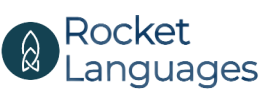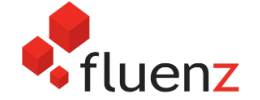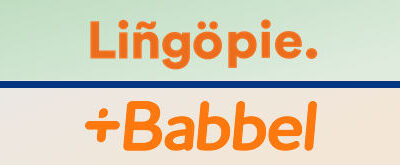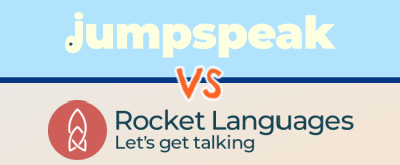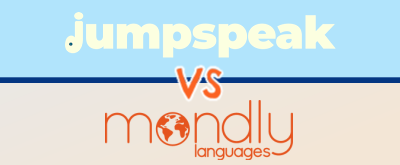Trying to pick just one language learning app between Rocket and Fluenz? Both get rave reviews, but after using both companies’ Spanish language courses, we definitely have a favorite. Learn more about each company and how their programs stack up in this post.
Video Review: Fluenz vs Rocket Languages
In the video above, Bianca from the Guide 2 Fluency team gives a full comparison of Fluenz vs Rocket Languages. She covers how each programme teaches languages, key features, pros and cons, pricing, and whether Fluenz or Rocket Languages is worth it compared to other language learning apps. For more detail, be sure to continue reading our full written comparison below.
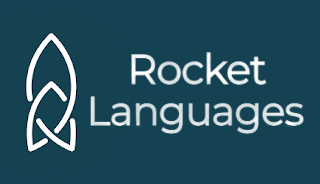
Sale: 60% OFF
Use Code: INSIGHT60
|
$180 Lifetime |
Our absolute favorite app to learn a new language. With audio lessons, detailed grammar instruction, and diverse exercises, Rocket is the one-stop app. |
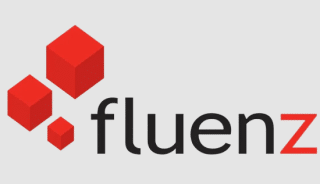
Discount: 5% OFF
Applied in Cart
|
$250 Lifetime |
A comprehensive language program that we found to be highly immersive and packed with solid video-based instruction, but also very tedious. |
Editor’s Choice
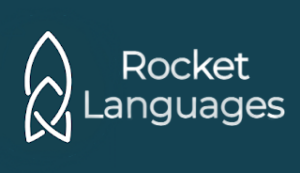
Rocket Languages
- Free Trial
- Money Back Guarantee
Pros
- Comprehensive lessons that dive deep with audio exercises and interactive drills
- Highly engaging audio lessons (best in the language learning industry)
- Dedicated grammar lessons with detailed teaching points
- Helpful cultural insights integrated into coursework
- Top-notch speech recognition technology
Cons
- Lessons are somewhat lengthy (45-60 mins)
- Wish lessons included more visual elements
How Rocket Languages Works
Rocket Languages is built around an interactive series of audio lessons. Imagine the classic language tapes from the past, but with a more modern, digital twist.
Anyway, each unit starts with a 30-minute guided audio session. An English-speaking moderator walks you through real-life conversations in your target language, giving you time to hear, understand, and repeat phrases. After each exchange, there’s a pause for explanations, or for you to jump in and practice by repeating key words and phrases.
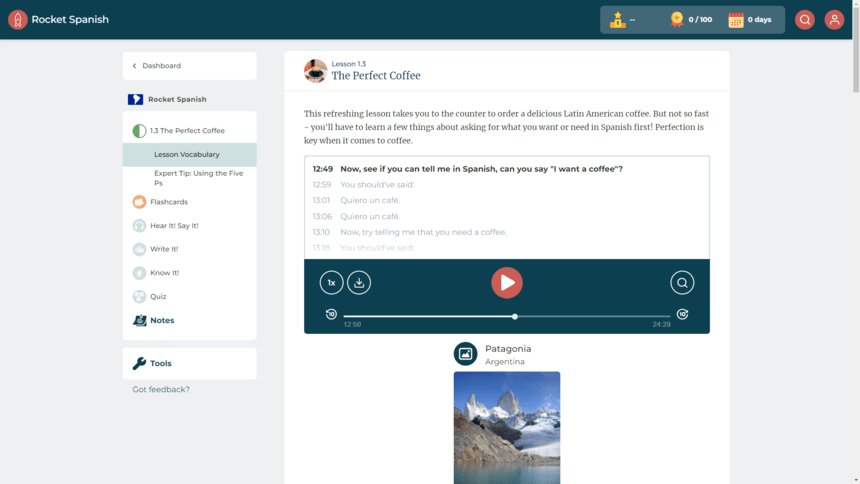
As the audio plays, you’ll have a scrolling transcript right below the control panel. This feature is a major win for visual learners in my opinion, as it is a benefit to see the written words as you go along.
Once you finish the audio session, it’s time to reinforce what you’ve learned through interactive drills. These include listen-and-repeat exercises, flashcards, quizzes, and even a role-play where you get to reenact the conversation by taking on one of the speaker’s roles.
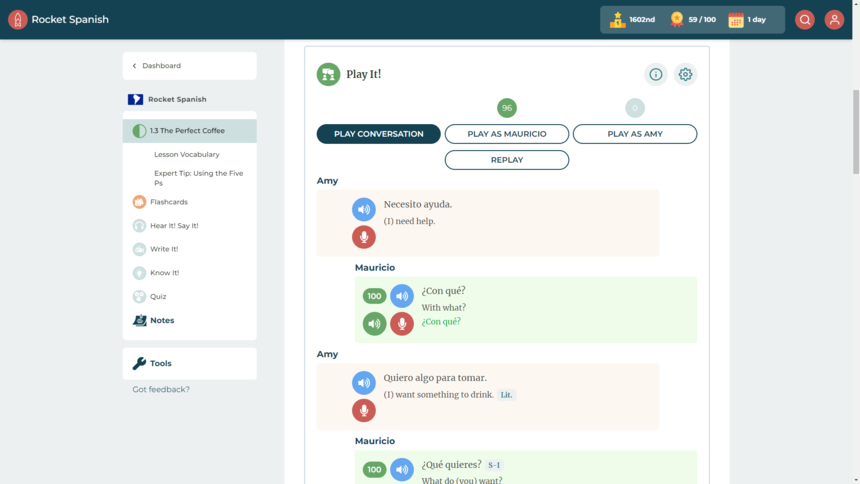
In addition to the audio sessions, Rocket’s Language & Culture lessons dig deeper into grammar and cultural insights. Here, Rocket breaks down the grammar rules covered in the audio lesson, providing clear examples and visuals that keep things bite-sized and approachable. It’s designed to help you understand structural differences between English and your target language, while giving you a few cultural insights along the way.
Why To Choose Rocket Languages
Knowing how the Rocket program works, let’s now cover the reasons why I would choose them if I were in your shoes.
Detailed and Engaging Audio Lessons
One of Rocket’s biggest strengths is its audio-based approach. Unlike many language apps, Rocket centers its learning on immersive, guided audio lessons. These lessons get you comfortable thinking and speaking spontaneously, which is essential for real-world conversations.
After the lesson, you can replay the full conversation and take on the role of one of the speakers. This mix of listening, speaking, and role-play is a game-changer, and I loved this aspect of the Rocket program.
Straightforward Grammar Support
Rocket Languages takes grammar seriously. Unlike apps like Rosetta Stone and Duolingo, which let users pick up grammar more organically, Rocket provides short, clear grammar explanations. Each Language & Culture lesson tackles specific points directly, using examples and visuals to make the rules stick.
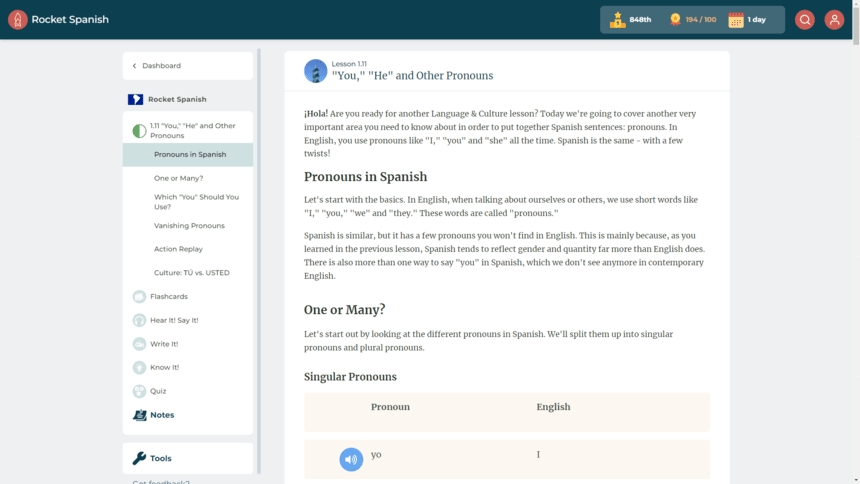
Personally, I find these lessons much more effective at explaining the structural differences between English and other languages.
A Well-Rounded Learning Structure
Finally, Rocket’s comprehensive structure makes it feel like a fully developed language learning system. Each unit is packed with detailed audio lessons, a range of reinforcement drills (like flashcards and quizzes), Language & Culture lessons, and extras like survival kits and leaderboards. In comparison to Fluenz, Rocket feels like a more complete language course.
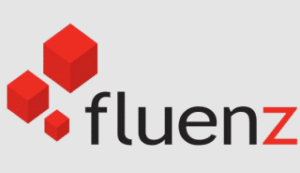
Fluenz
- 30-Day Guarantee
- Multiple Plans
Pros
- Very immersive experience, with several drill types per lesson
- Loved the engaging video lessons
- Had a small classroom or tutoring like feel to it
Cons
- Found most lessons to be tedious and dry
- The program itself is very dated
- Teaches more formal or academic way of speaking
How Fluenz Works
While Rocket Languages tends to focus on audio instruction, Fluenz is more about video-based instruction. They use a unique method of teaching which incorporates video lessons led by instructors who introduce vocabulary and explain grammatical concepts in detail. In this sense, Fluenz is like Rocket in that it helps learners understand the nuances of the language, which is often lacking in other programs that rely heavily on context or imagery alone (see Rosetta Stone and Mondly).
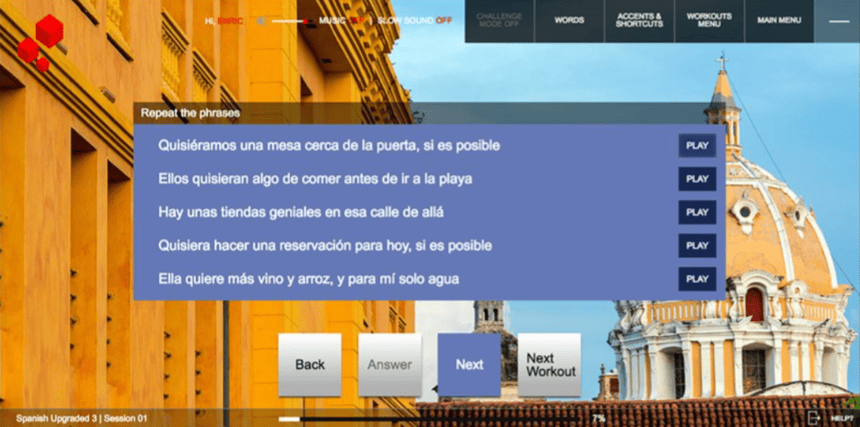
The Fluenz program overall offers a pretty structured and immersive experience, acting more like a private tutoring session than a traditional course with interactive exercises.
The program is organized into levels, each containing multiple lessons. Each lesson begins with a video that sets the context for subsequent exercises, known as “workouts,” which reinforce the material learned.
This sequential approach (somewhat like Rocket’s approach) ensures that learners revisit words and concepts multiple times, helping with retention. After the introductory videos, you engage in various exercises designed to practice and reinforce your understanding. In my opinion, the program emphasizes repetition and contextual learning, which makes it effective, though tedious.
Why To Choose Fluenz
Next, find a couple of big reasons why I would choose Fluenz.
Engaging Video Lessons
One of the biggest draws to Fluenz is their integration of video lessons. From the start of each session, you’re guided by an instructor who introduces the concepts you’ll be working on, giving a solid overview of what’s ahead.
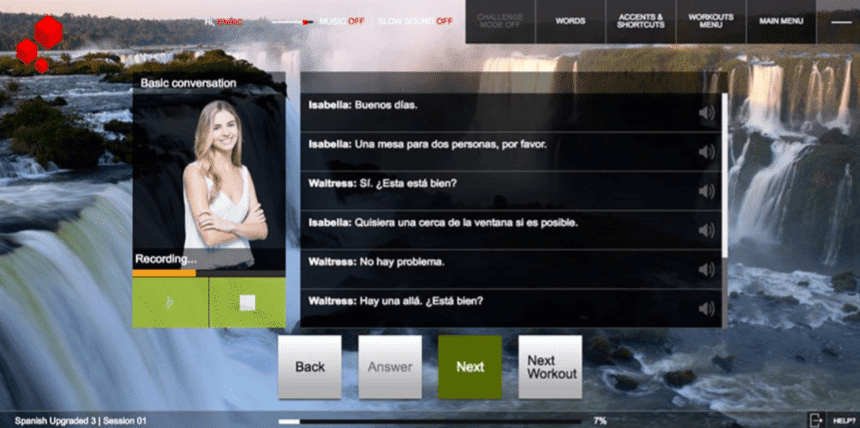
Afterward, you’ll dive into a series of practice drills (or again, “workouts,” as Fluenz calls them). But it doesn’t stop there. Between these exercises, more videos pop in to further break down what you’re learning. It’s a layered, immersive approach, and I found it super effective for solidifying the material. Sure, the videos can feel a bit scripted (and even corny), but having an instructor visibly guiding you through each step really does help with retention.
Classroom-Style Learning Experience
Fluenz’s use of on-screen instructors gives their lessons a unique, classroom-like quality that most language apps just don’t have. It seems intentional too. Fluenz describes their lessons as similar to a 1-on-1 tutoring session, and I get it. Honestly, I wouldn’t go that far—it’s still a pre-recorded setup—but it does have a distinctly different feel compared to other apps’ more DIY approach.
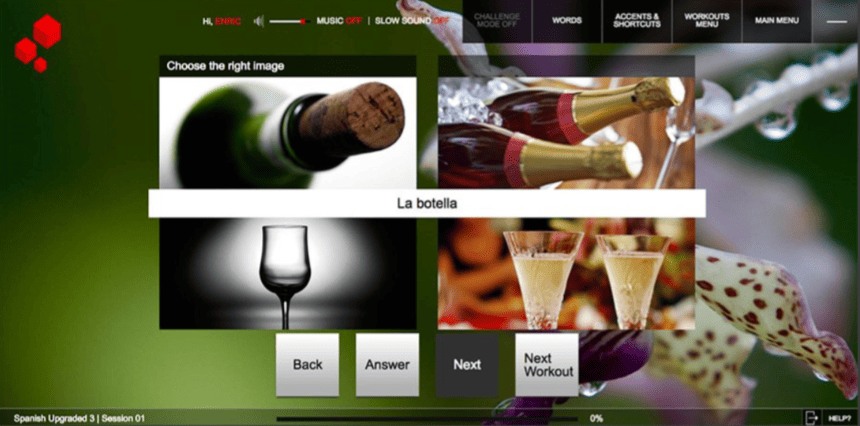
If you’re someone who thrives in a classroom environment or prefers a more guided learning style over self-study, Fluenz could be a good match. It has a vibe that’s more aligned with traditional teaching, making it a good alternative to standard language apps.
Conclusion: Rocket Languages or Fluenz?
While Fluenz has some strong features that I found effective, Rocket Languages provides a more well-rounded and immersive experience in my opinion. Its detailed audio lessons, thorough grammar explanations, and interactive practice drills gave it an edge in keeping me engaged and making progress. Between the two, I’d lean toward Rocket as my top pick.
While Rocket Languages tends to focus on audio instruction, Fluenz is more about video-based instruction. Both offer immersive curriculums, and both use interactive drills to reinforce the main lesson’s teaching points, but they have different styles.
The two programs are pretty competitively priced. Both sell lifetime plans, which cost anywhere from $150 to $450. Neither has a monthly subscription option.

